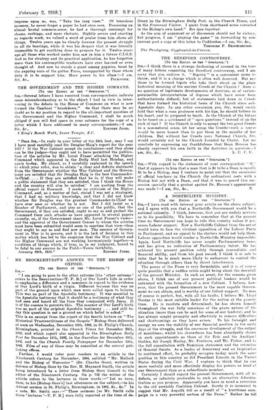THE GOVERNMENT AND THE HIGHER COMMAND. (To THE EDITOR OF
THE " SPECTATOR.") SIR,--Several letters I have received from correspondents indicate some misunderstanding as to the object I had in view in inter- vening in the debate in the House of Commons on what is now termed the Cambrai " breakdown." So that there may be no doubt as to my position in regard to the all-important question of the Government and the Higher Command, I shall be much obliged if you will find space in your columns for the copy of a letter whioli I have addressed to many correspondents.—I am,
" DEAR SIR,—In reply to your letter of the 24th inst., may I say I have moist carefully read Sir Douglas-Haig's report for the year 1917 ? If the War Cabinet accept its conclusions—and they alone can be the judges—they ought not to have permitted the publica- tion of the articles by Mr. Levet Fraser attacking the Higher Command which appeared in the Daily Mail last Monday, and again to-day. My object, as I carefully explained in the speech to which your refer, was to obtain a clear and definite statement from the Government whether the War Cabinet and the Govern- ment are satisfied that Sir Douglas Haig is the best Commander- in-Chief. . . . If they are satisfied that he is, if they will make a public statement that they are satisfied, then 1 think the House and the country will also be satisfied.' I am quoting from the official report in Hansard. I made no criticism of the Higher Command, and, as a matter of fact, stated I was not a strategist, that I had no military knowledge, and that I did not know whether Sir Douglas was the greatest Commander-In-Chief we have ever seen or whether he is not. But I did insist as a Member of Parliament, and also as one of the public, that the 'Government, if they are satisfied, ought to say so and protect the Command from such attacks -us have appeared in several papers recently, or, if the Government share Mr. Levet Fraser's views— and the approval of the Government Censor to whom the articles must have been submitted would seem to sanction that view—then they ought to say so and find new men. The essence of Govern- ment in War is to govern, and it is the lack of decision in this matter which has led to the suspicion that the War Cabinet and the Higher Command are not working harmoniously together—a condition of things which, if true, is, in my judgment, bound to be fatal to our success in the Field.—Yours faithfully,
January 98th, 1918." KENNEDY JONES.


































 Previous page
Previous page